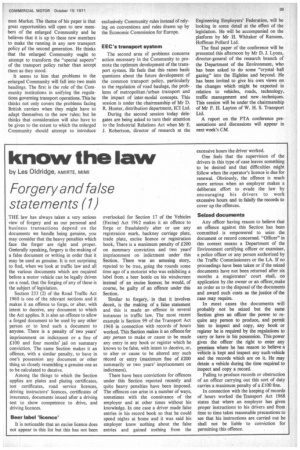know the law
Page 45

If you've noticed an error in this article please click here to report it so we can fix it.
by Les Oldridge, AMIRTE, MIMI
Forgery and false statements (7)
THE law has always taken a very serious view of forgery and as our personal and business transactions depend on the documents we handle being genuine, you may consider that the heavy penalties which face the forger are right and proper. Gefierally speaking, forgery is the making of a false document or writing in order that it may be used as genuine. It is not surprising to find, when we look at traffic law and all the various documents which arc required before a motor vehicle can be legally driven on a road, that the forging of any of these is the subject of legislation.
Section 233 (2) of the Road Traffic Act 1960 is one of the relevant sections and it makes it an offence to forge, or alter, with intent to deceive, any document to which the Act applies. It is also an offence to allow a forged document to be used by any other ' person or to lend such a document to anyone. There is a penalty of two years' imprisonment on indictment or a fine of 100 and four months' jail on summary conviction. The same Section makes it an offence, with a similar penalty, to have in one's possession any document or other thing so closely resembling a genuine one as to be calculated to deceive.
Among the things to which the Section applies are plates and plating certificates, test certificates, road service licences, driving instructors' licences, certificates of insurance, documents issued after a driving test to show competence to drive, and driving licences.
Beer label 'licence' It is noticeable that an excise licence does not appear in this list but this has not been overlooked for Section 17 of the Vehicles (Excise) Act 1962 makes it an offence to forge or fraudulently alter or use any registration mark, hackney carriage plate, trade plate, excise licence or registration book. There is a maximum penalty of £200 on summary conviction and two years' imprisonment on indictment under this Section. There was an amusing story, reputed to be true, going the rounds some time ago of a motorist who was exhibiting a label from a beer bottle on his windscreen instead of an excise licence; he would, of course, be guilty of an offence under this Section.
Similar to forgery,in that it involves deceit, is the making of a false statement and this is made an offence in several instances in traffic law. The most recent example is Section 99 of the Transport Act 1968 in connection with records of hours worked. This Section makes it an offence for any person to make or cause to be made any entry in any book or register which he knows to be false, with intent to deceive, or, to alter or cause to be altered any such record or entry (maximum fine of £200 summarily or two years' imprisonment on indictment).
There have been convictions for offences under this Section reported recently and quite heavy penalties have been imposed. The offences can arise in a number of ways, sometimes with the connivance of the employer and at other times without his knowledge. In one case a driver made false entries in his record book so that he could spend nights at home and it was said his employer knew nothing about the false entries and gained nothing from the excessive hours the driver worked.
One feels that the supervision of the drivers in this type of case leaves something to be desired and that difficulties might follow when the operator's licence is due for renewal. Obviously, the offence is much more serious when an employer makes a deliberate effort to evade the law by encouraging his drivers to work excessive hours and to falsify the records to cover up the offences.
Seized documents Any officer having reason to believe that an offence against this Section has been committed is empowered to seize the document or record concerned. "Officer" in this context means a Department of the Environment certifying officer or examiner, a police officer or any person authorized by the Traffic Commissioners or the LA. If no proceedings have been taken or if the seized documents have not been returned after six months a magistrates' court shall, on application by the owner or an officer, make an order as to the disposal of the documents and award such costs as the justice of the case may require.
In most cases the documents will probably not be seized but the same Section gives an officer the power to require any person to produce, and permit him to inspect and copy, any book or register he is required by the regulations to carry or have in his possession. This power gives the officer the right to enter any premises where he has reason to believe a vihicle is kept and inspect any such vehicle and the records which are on it. He may detain a vehicle during the time required to inspect and copy a record.
Failing to produce records or obstruction of an officer carrying out this sort of duty carries a maximum penalty of a £100 fine.
In connection with the keeping of records of hours worked the Transport Act 1968 states that where an employer has given proper instructions to his drivers and from tune to time takes reasonable precautions to see that his instructions are carried out he shall not be liable to conviction for permitting this offence.
















































































































